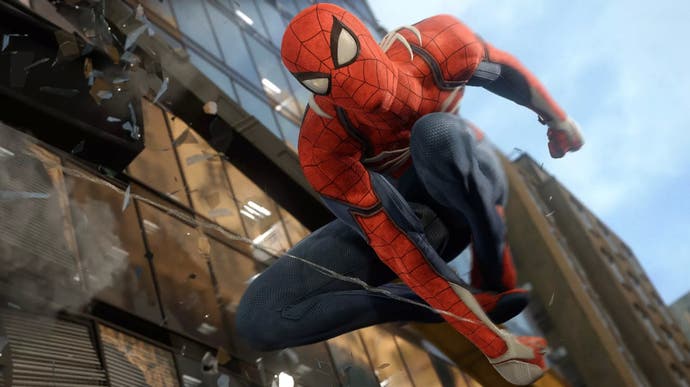Spider-Man and the question of, whose story is this?
Bloat against the current.
A lot of scriptwriting lore has pretty much gone mainstream by now. We're all supposed to know that good writers show and don't tell - so much so that it's enough to make you ask, reeeeeeally...? - and if you hang about around the local cinema you'll probably hear people coming out of screenings talking about delayed third acts and all that kind of densely technical stuff. (Also you'll go home smelling of popcorn, which is always money in the bank.) One of the most interesting things that scriptwriters like to talk about, though, doesn't seem to have broken through in quite the same way. One of the most interesting questions scriptwriters often ask themselves is also one of the most fundamental. Whose story is this?
Whose story is this? is a useful question to ask when you have a hero who keeps falling out of the plot, missing key scenes or turning up and having little to do. It's good for ensemble pieces - Whose story is Lost? I'm still turning that one over - and it's a nice way of getting a handle on a narrative that seems less than eager to come into focus. I know it's not a film - not a good one anyway lol - but stepping back from The Great Gatsby to ask whose story is this? is a whole afternoon of fun at the Donlan house, although maybe just for me. It's the kind of conversation that makes my wife announce she's willing to take up wood-chopping just to get out of the room. (Also, I think it's Carraway's. Not because he's the narrator, because that should probably count against him here, but because he has the moment where he talks about going home from school at winter towards the end, which has always struck me as a section in which a great unpicking of the knot is taking place. Don't agree? Sound off in the comments!)
Before you start to think about taking up wood-chopping, I should add that the whose story is it? question is particularly interesting when applied to games. I think this is because both authorship and narrative are muddled in games by a sense of doubleness. There's you on screen and also you on the other side of the screen. Gosh this is tricky!

I appreciate this sounds like an annoying postmodern talking point - the kind of thing you have up your sleeve in case you're ever stuck in a lift with Lacan. I think it's worth thinking about, though, because of the bloat and waywardness that always seems to be a problem with open-world games. When you ask, whose story is it? interesting things start to happen.
Spider-Man is, of course, a really handy example. Not just because it's still fresh in my mind, but because it's an open-world game that did all the usual stuff but didn't seem to suffer from bloat. People have been coming into the office all week, in fact, after Spider-Man's kept them up until four in the morning, and they all say the same thing: the usual side quests and secondary objectives that they've done a hundred times in other games feel a little more appealing here. The bloat isn't bloating.
I suspect the reason is because in Spider-Man absolutely everything in the game is channeled through the character. The plot is his problem to solve mechanically, very obviously, and also on an implicit, thematic level. Equally, his two main modes of being in the game - swinging around and administering a kicking - both seem to emerge from who he is - from his youth, his frustrating personal life, his desire to get where he's going fast. This sounds obvious, but not all games do this. How many games are you playing where you find yourself mowing people down and parkouring all over the shop just because that's what you do in games? In Spider-Man, it's all an expression of character.
And this feels true of the side stuff. Sure, visiting a bunch of monuments in a game is classic open-world busywork, but of course Spider-Man wants to take pictures of New York. He's Peter Parker, and Peter Parker takes pictures. Sure he wants to help his pal out with his science projects. Sure he wants to get all those police towers up and running - he's Spider-Cop for heaven's sake! (How many other games have allowed such space for a personal riff like Spider-Cop to play out, incidentally? Ten years from now, I will probably not remember the final boss fight of this game, but I will remember Spider-Cop playing out in my ear as I gadded back and forth across Manhattan.)
 6 Things We Loved About Marvel's Spider-Man (And 1 Thing We Didn't) Marvel's Spider-Man PS4 Gameplay
6 Things We Loved About Marvel's Spider-Man (And 1 Thing We Didn't) Marvel's Spider-Man PS4 Gameplay
Weirdly, Assassin's Creed is another game that gets a lot of these things right, even though when it comes to bloat, few games have ever gotten bloatier than this. I think the reason Assassin's gets away with it is because it makes the dual authorship - or the dual protagonist set-up - of video games explicit. Why shouldn't you collect feathers and gather pages for Benjamin Franklin? Because while you're Ezio, or Connor, you're also someone back in the present lying about and effectively playing video games. You're looking at this marvelous world down the barrel of an Animus. Even so, Ubisoft pushes it too far now and then. I may be a citizen of the future thrilling to the bustle of the Renaissance, but that still doesn't mean I want to play your tower defence game.
When these games click, it's because the side stuff works for the player on the sofa but also makes sense for the person on screen, I think. When it feels like bloat, I reckon, is when the character on the screen simply wouldn't have time for this other stuff. As much as I loved zapping street musicians in InFamous, for example - and I loved it quite a lot - it seemed odd, even in support of the evil track to the narrative, that the protagonist of a city in such danger would find the time to do such unusual things.
Speaking of people who do unusual things, I have a colleague who once told me he likes to play driving games while wearing racing gloves. Strange as this sounded at the time, I think it gets at exactly what I'm talking about. There is a peculiar warmth, a peculiar harmony to be found when player and avatar are completely aligned. There is a joy there when you ask, whose story is it? and realise: it belongs to the both of us.

